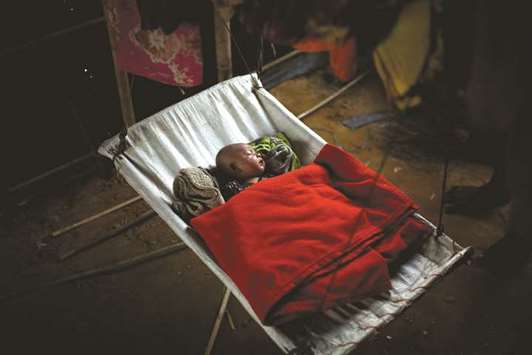“Myanmar is still cooperating with the special rapporteur mechanism,” said Ministry of Foreign Affairs spokesman Kyaw Moe Tun.
“But Ms Yanghee Lee’s undertakings don’t have impartiality and objectivity,” he said, adding that Myanmar had asked the United Nations to replace her with someone who knows Myanmar well and is both fair and impartial.
Lee had been due to visit Myanmar next month to assess human rights across the country, including alleged abuses against Rohingya Muslims in Rakhine State, but on Wednesday she said she had been barred from visiting for the rest of her tenure.
She called for stronger international pressure to be exerted on Myanmar’s military and said in a statement that the ban suggested something “terribly awful” was happening in the country.
More than 650,000 Rohingya have fled into Bangladesh since August 25, when attacks by Muslim insurgents on the Myanmar security forces triggered a sweeping counter-offensive by the army and Buddhist vigilantes.
Surveys of Rohingya refugees in Bangladesh by aid agency Medecins Sans Frontieres have shown at least 6,700 Rohingya were killed in Rakhine state in the month after violence flared up on Aug 25, the aid group said last week.
The UN High Commissioner for Human Rights Zeid Ra’ad al-Hussein has called the violence “a textbook example of ethnic cleansing” and said he would not be surprised if a court eventually ruled that genocide had taken place.
Myanmar has rejected accusations of ethnic cleansing, blaming most of the violence and torching of Rohingya villages on the Rohingya insurgents who attacked the security forces.
Lee had planned to use her visit to find out procedures for the return of Rohingya refugees, and to investigate increased fighting in Kachin State and Shan State in northern Myanmar, where the army is battling autonomy-seeking ethnic minority insurgents.
Kyaw Moe Tun, who is director general of the foreign ministry’s International Organizations and Economic Department, said a statement released by Lee after her last visit in July “was not objective and not impartial”.
“If she comes again and does that, it is not easy to cooperate with us and have a positive attitude,” he said.
Lee said in July that activists and journalists continued to be followed and questioned by state surveillance agents, and that her visit was beset by official snooping and access restrictions.
The office of Myanmar leader Aung San Suu Kyi said at the time that it was “disappointed” with Lee’s end-of-mission statement, which contained “many sweeping allegations and a number of factual errors”.
It did not give any details and did not directly address the issues of access or surveillance.
Turkey’s prime minister on Wednesday dubbed the killing of minority Muslim Rohingyas in Myanmar by its security forces “genocide” and urged the international community to ensure their safety back home.
Binali Yildirim met several Rohingyas in two refugee camps in Cox’s Bazaar in neighbouring Bangladesh.
Almost 870,000 Rohingya fled there, about 660,000 of whom arrived after August 25, when Rohingya militants attacked security posts and the Myanmar army launched a counter-offensive.
“The Myanmar military has been trying to uproot Rohingya Muslim community from their homeland and for that they persecuted them, set fire to their homes, villages, raped and abused women and killed them,” Yildirim told reporters from Cox’s Bazar, before flying back to Turkey.
“It’s one kind of a genocide,” he said.
“The international community should also work together to ensure their safe and dignified return to their homeland,” Yildirim, who was accompanied by Bangladesh’s Foreign Minister Abul Hassan Mahmood Ali, said.
The UN High Commissioner for Human Rights Zeid Ra’ad al-Hussein has called the violence “a textbook example of ethnic cleansing” and said he would not be surprised if a court eventually ruled that genocide had taken place.
Yildirim inaugurated a medical camp at Balukhali, sponsored by Turkey, and handed over two ambulances to Cox’s Bazar district administration. He also distributed food to Rohingya refugees at Kutupalong makeshift camp.
He urged the international community to enhance support for Rohingyas in Bangladesh and help find a political solution to this humanitarian crisis.
UN investigators have heard Rohingya testimony of a “consistent, methodical pattern of killings, torture, rape and arson”.
The United Nations defines genocide as acts meant to destroy a national, ethnic, racial or religious group in whole or in part.
Such a designation is rare under international law, but has been used in contexts including Bosnia, Sudan and an Islamic State campaign against the Yazidi communities in Iraq and Syria.
Nobel peace laureate Aung San Suu Kyi’s less than two-year old civilian government has faced heavy international criticism for its response to the crisis, though it has no control over the generals it has to share power with under Myanmar’s transition after decades of military rule.
Yildirim’s trip follows Turkish first lady Emine Erdogan’s visit in September to the Rohingya camp, when she said the crack down in Myanmar’s Rakhine state was “tantamount to genocide” and a solution to the Rohingya crisis lies in Myanmar alone.

